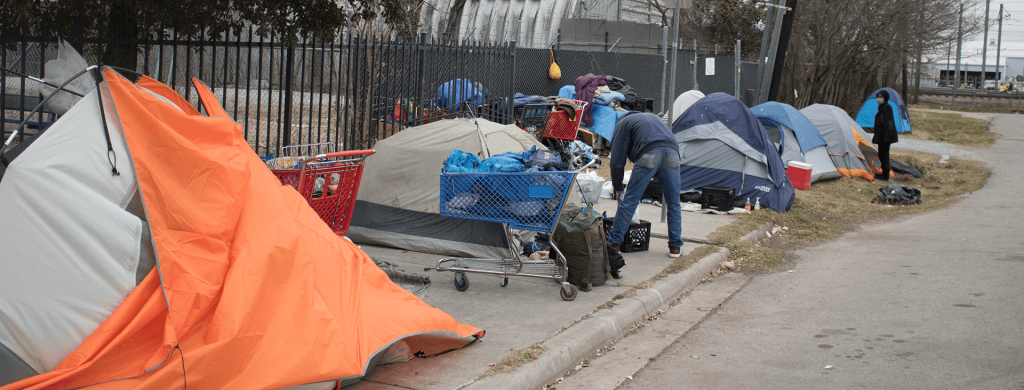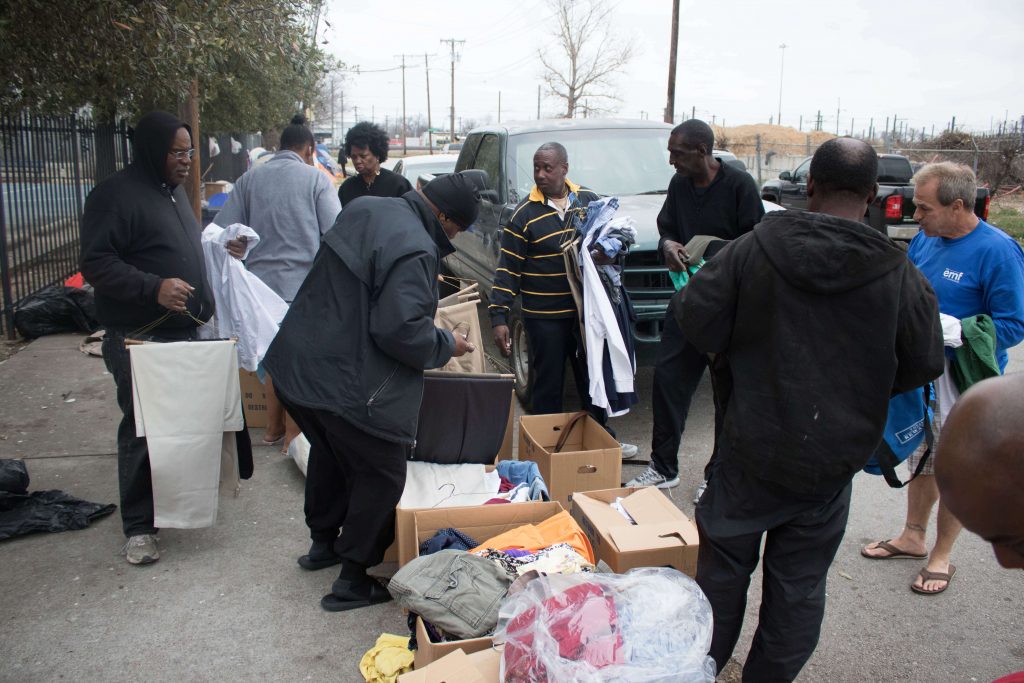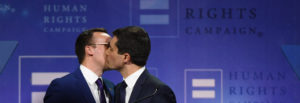It was a rainy and cold evening, about forty degrees to be exact. Darryl was thin; he probably weighed less than one hundred and ten pounds soaking wet. His body shook from the chilled air. He suffers from liver cancer, kidney disease and bipolar disorder. For twenty-five years, he has lived under bridges and slept under cardboard boxes until his diligent caseworker helped him found him a cottage at CitySquare two months ago.
The next day I bought two sleeping bags and tried to deliver one to him. I could not find him in the usual places. I gave one to another homeless man wearing shorts and making a sleeping pallet on the sidewalk for the night. It had to be 35 degrees. I kept the other bag in my car for a few days hoping to see Darryl. I hoped he had not died. He did not; I saw him several months later.
The Sufferings of Inner City Black Men
Darryl’s story represents many homeless people in South Dallas. Like Darryl, most are black males. This dilemma raises several questions.
- Why are so many black men in South Dallas living in poverty, under bridges, mentally ill, unemployed and dreamless?
- Do Christ followers have a Biblical duty to help them?
- If we have an obligation to help, what should we do?
The answer to the first question is multifaceted, albeit, the main culprits are a legacy of white supremacy and racial hostility. The answer to the second question is a simple yes. Many scriptures obligate Christ followers to serve the poor, sick, imprisoned and suffering (Matthew 25:31-48).
Regarding the third question, I offer several actions below. Before offering my suggestions let me make this observation. I feel obligated to consistently speak out on the sufferings of black males because too many black ministers are silent. Our silence leaves a vacuum for voices like Louis Farrakhan and the Black Muslims. I mention Mr. Farrakhan and his followers specifically because they are present and making their voices heard in South Dallas. As much as I disagree with their rhetoric, I admire the fact they are consistently present. That is much more than I can say for the body of Christ. We are missing in action.
Churches Must Step Up With Solutions
Meanwhile, how can we help Darryl and others like him? The answer depends on the specific problems they face. For instance, Darryl has spiritual, economical, mental, and medical problems. South Dallas and other inner city churches should mobilize and offer Darryl and other homeless and unemployed black men a myriad of services to solve their problems. The ten-point plan below is a good starting point for churches:
-
Christian Discipleship
Since the root of all human problems and misery is sin churches should help Darryl and his contemporaries become authentic Christ followers. Only Christ can cure the sin problem. Neither behavior modification, treatment, incarceration or any other human solution can successfully tackle sin like becoming an authentic Christ follower. The likelihood of Darryl becoming an authentic Christ follower, however, depends on the willingness of inner-city churches to pursue Darryl and other homeless men and not wait for them to visit their churches.
-
Free Housing
Churches should offer Darryl free housing. Darryl is disabled and cannot work due to his physical and mental health illnesses. He can barely stand upright. He cannot afford to pay housing costs. Churches should create low-income or free housing opportunities to meet this need. Private and public funding programs exist that can help churches finance free and low-income housing. What’s more, there are countless abandoned and boarded up houses and buildings throughout South Dallas that churches can restore.
-
Healthy Food
Churches should offer Darryl healthy food. Every church in the inner city should have a free healthy food pantry and grow a garden. Poor people like Darryl struggle every day for food, especially healthy foods. Most inner cities are food deserts that lack affordable and healthy foods because large national food chains refuse to open stores there. Inner city residents buy unhealthy foods from small liquor stores at exorbitant prices. Churches should lobby national food chains to open stores in the inner-city and simultaneously work to close liquor stores.

-
Job Creation
Because unemployment is a huge issue in the inner city churches should help create jobs and startup businesses. Joblessness seems to be the reason for the unemployment. Like national food chains, major employers shun inner-cities although most inner city residents want jobs. Many whites such as Congressman Paul Ryan ignorantly and incorrectly believe inner city black men do not want jobs. Ryan later admitted he was wrong, but his admission did nothing to convince major employers to create jobs in inner-cities. Churches can help inner city residents create their own businesses and jobs.
-
Spiritual Deliverance
Churches should provide Darryl deliverance from substance abuse and mental illnesses. Most men in Darryl’s situation medicate with alcohol or drugs. Crack or heroin seems to be their drug of choice, and schizophrenia and bipolar disorder are the common mental health illnesses. Some battle both substance abuse and mental illness. God has anointed His Church to set Darryl and his companions free from all bondages.
-
Neighborhood Beautification
Churches should help beautify their neighborhoods. Garbage and filth cover the streets of many inner city communities causing inner city residents to view themselves and their neighborhoods as worthless. Churches should sponsor campaigns to clean up the neighborhoods block-by-block. Like He did Adam, God placed us in our environments with the ability to make them productive and beautiful.
-
Youth Renewal
Nothing is more critical than churches rescuing inner-city youth and helping them avoid the outcome that Darryl is experiencing. Inner-city youth are filled with so much undeveloped talent. They are the most untapped national resource. There is a gold mine of genius in them just waiting to be harnessed, processed and released. Despite his often outlandish statements, Dr. Ben Carson is a shining example of this untapped inner-city resource. He grew up in the inner city of Detroit but rose to become a brilliant neurosurgeon whose talents the seductions of inner-city life almost wasted.
-
Achievement Gap
Black students have lower scores on standardized tests than other students. This gap in test scores is called the academic achievement gap. It indicates that public schools are doing a poor job educating black students. It is a nationwide problem that has persisted since the seventies. Churches should work with schools to close the academic achievement gap. Here’s how it relates to the inner city and homelessness? Darryl and most of his buddies are high school dropouts, which severely affects their ability to earn money. Darryl dropped out of high school in the ninth grade. Perhaps he would have graduated had a local church offered him academic support before, during or after school. Understanding the academic achievement gap helps churches understand the subjects and grades that Darryl was failing in. Churches can help close this gap vis-à-vis after school, mentoring, early childhood development, and gang prevention programs, just to name a few.

-
Political Involvement
Politicians have done little to help inner city neighborhoods including South Dallas. This failure means churches should step up their involvement in the political arena, especially in races for the school board, city council, county commissioner, county judge, district attorney’s office, sheriff, mayor, and other local races. With Trump issuing an executive order to weaken the Johnson Amendment, churches can enter the political arena with new vigor without fear of IRS retaliation. Churches should not only register and mobilize voters but identify and sponsor candidates who share our Kingdom agenda.
-
Organize
Churches offer the greatest and best chance to transform inner city areas. City, state and federal governments, as well as businesses, undoubtedly play a vital role, but churches are the best hope for the inner city. One reason churches offer such a strategic advantage is the sheer number of churches in inner-cities. Some inner city blocks have multiple churches. If inner-city churches mobilize into a unified force, taking the Kingdom of God to inner city neighborhoods and transforming them into nice and safe places to live and raise children would be more feasible. The Kingdom of God is the only hope for the inner city since it is the only antidote to the kingdom of darkness.
Conclusion
The problems in the inner city that undermine black men, and by extension, the black community, are not insurmountable. We can fix them. We can turn them around. We can save inner-city black men. Moreover, for every black man we save, we enjoy the simultaneous and added benefit of saving a black family, son, daughter, grandson, granddaughter and much more since the black man is the foundation of the black family and community. Jesus told us all things are possible to him who believes (Mark 9:23). Faith can move mountains and silence storms. However, faith without works is dead, unproductive and dull. We must get busy saving our inner cities. We must mobilize around our mandate of going into all the world and making disciples (Matthew 28:19-20). Saltmakers Church is ready to work. What about you?


